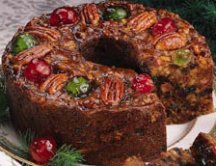Fruitcake: Holiday Tradition or Joke?

“The worst Christmas gift is fruitcake,” cracked Johnny Carson on the Tonight Show. “There is only one fruitcake in the entire world, and people keep sending it to each other, year after year.”
We all hear the infamous fruitcake jokes year after year: “Why does fruitcake make the perfect gift? Because the U.S. Postal Service hasn’t found a way to damage it.” And, “If you don’t like it, use it as a doorstop.” But the epitome of all fruitcake jokes has to be the Great Fruitcake Toss held each year in Manitou Springs, Colorado, where people pitch them, launch them, toss them – everything but eat them. And if you don’t have your own fruitcake they’ll rent you one for a dollar.
People either love fruitcake or they hate it.
Fruitcake dates back beyond Roman times when the recipe included pomegranate seeds and pine nuts. Fruitcake was used to sustain Roman Legions during their long, arduous campaigns, as well as the Christian armies during the Crusades.
Why Christmas became synonymous with fruitcake seems to be unknown, but it is thought to have been started by English nobles who passed out a slice of plum cake to poor carolers in the late 1700s.
Europeans have been baking the dense, spirit-drenched cake for ceremonial celebrations such as religious holidays, weddings, christenings, and birthdays since the early 18th century. In England, it is still a custom that if unwed guests put a piece of wedding cake--usually a dark fruitcake--under their pillow, they will dream of the person they will marry. And of course, a Victorian tea would not be complete without a few slices of fruitcake.
 Fruitcake is thought to have made its appearance in America during the Revolutionary War. By the late 1800s, decorated tins became the packaging of choice for this hefty confection, and in the early 1900s, a Texas company founded the first fruitcake mail-order business.
Fruitcake is thought to have made its appearance in America during the Revolutionary War. By the late 1800s, decorated tins became the packaging of choice for this hefty confection, and in the early 1900s, a Texas company founded the first fruitcake mail-order business.
Some of you may raise the question, “Does anyone really eat fruitcake?” According to a survey conducted by an independent research company, the answer to that question is less than one-third of the people surveyed admit to eating it, except in the South. It seems Southerners are a bit fonder of fruitcake – over forty percent say they not only eat it during the holidays, but actually enjoy it. Perhaps this is a result of the two most prominent bakers of this fruit and nut laden delicacy in America being located in rural Southern communities. Also the South’s abundance of pecans and walnuts is thought to be the reason why modern fruitcake recipes contain such a plethora of nuts (“nutty as a fruitcake” was coined in 1935).
In spite of this evidence, it’s apparent that people everywhere do eat fruitcake. After all, annual fruitcake sales in this country exceed $100 million. That’s equal to more than 20 million cakes. Even the Great Fruitcake Toss can’t dispose of that many cakes.
 So for those of you who truly enjoy this traditional Christmas treat, we hope you'll try our recipe for a delicious Old-South Fruitcake that is dark and moist. In it the candied fruits have been eliminated in favor of dried fruits, as we believe they are more palate pleasing.
So for those of you who truly enjoy this traditional Christmas treat, we hope you'll try our recipe for a delicious Old-South Fruitcake that is dark and moist. In it the candied fruits have been eliminated in favor of dried fruits, as we believe they are more palate pleasing.
And for those of you who hate fruitcake, sit back, have a double shot of eggnog, and hope Aunt Millie doesn’t give you another doorstop this year.
Buy Em: Collin Street Bakery, Corsicana and Waco, Texas; Eilenberger Bakery, Palestine, Texas; Claxton Bakery, Claxton, Georgia; Assumption Abbey Bakery, Ava, Missouri
Make Em: Chef Monte's Old-South Fruitcake


